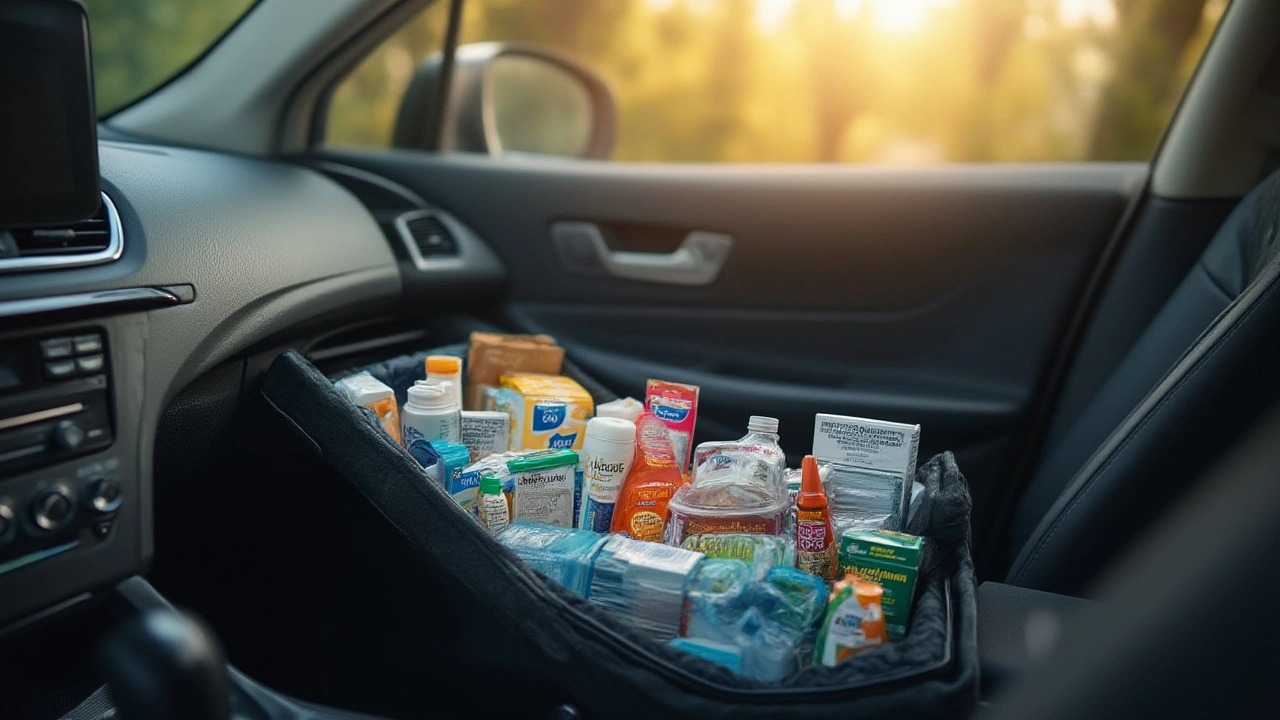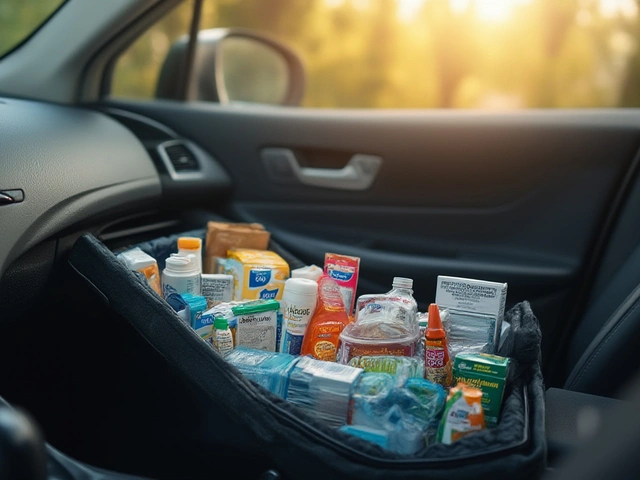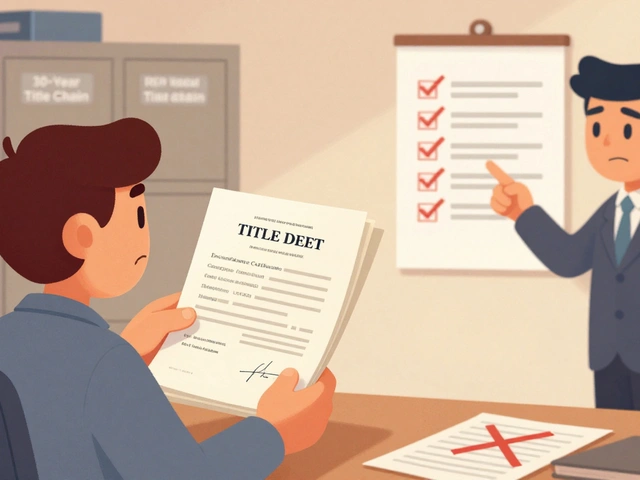Essential Car Meds: Emergency Medications to Always Keep in Your Vehicle
If you’ve ever found yourself miles from home dealing with a dodgy stomach, a killer headache, or a random allergic reaction, you’ll know that being caught unprepared is no fun. Maybe you had to search (with growing desperation) for a chemist in a town you didn't even mean to pass through. Or maybe, like me, you once spilled hot coffee on yourself and had nothing but a grimy napkin for first aid. The truth is, your car’s glovebox can be the most underrated emergency resource you own—if you stock it right.
The Core Medications You Shouldn’t Be Without
Before you go tossing your entire medicine cabinet into your trunk, think focused, not frantic. The best car med kit covers the basics: pain, allergies, wounds, stomach upsets, and any chronic needs you have. Why make room for bulky bottles of cough syrup you’ll probably never use?
Start with pain. Paracetamol or ibuprofen (think Panadol and Nurofen) are your non-negotiables for everything from headaches after a long day to the random aches of travel. Just check expiry dates every few months—heat makes tablets degrade faster. Some new parents keep a children’s painkiller (like liquid Panadol or Panadol suppositories) on hand if they often travel with littlies. While on the subject, antihistamines are a must, even if you’re not ‘that’ allergic. Sudden insect stings or a brush with mystery pollen can ruin an entire drive. Opt for non-drowsy ones like loratadine; you don’t want to nod off at the wheel.
On a similar track, carry a few plasters, bandages, and an antiseptic cream like Savlon or Betadine. Wounds happen everywhere, including petrol stations and the odd bushwalk detour. A proper car med kit, according to the Royal Australian College of General Practitioners, should have sterile gauze pads and adhesive tape too. Having all these handy means you can actually stop bleeding or clean a cut properly before heading to the doc—not just slap a napkin over it. For burns (coffee again!), a small burn gel sachet is a lifesaver.
Next: stomach drama. You’d be surprised how often someone needs an antacid like Mylanta, or a loperamide (Imodium) tablet when a rest stop is still miles away. Keep rehydration sachets like Hydralyte for dehydration emergencies—especially if you’re driving in Aussie summer heat or with kids who are prone to car sickness. And don’t forget, if you’re sensitive to motion, pop a few travel sickness pills like Kwells in your kit.
Finally, think about what’s essential for you, your family, and your usual passengers. Got asthma, diabetes, epilepsy? Don’t just rely on your main bag—stash a backup inhaler, an EpiPen, or emergency meds in the car. There’s a saying in travel medicine: your backup is only as useful as the distance you’re willing to walk to get it. Sure, prescriptions usually need to live with you, but having a ‘just-in-case’ supply could save real time when help is hours away.

Making Your Car Med Kit Safe and Practical
So, now you know what to keep—but where and how? Australian summers are brutal. Medications degrade faster in the heat. A study published by the Therapeutic Goods Administration found that some common meds lost over 20% effectiveness when left at 40°C for two weeks straight. Bet your boot gets hotter than that in summer. Solution? Use a soft cooler bag, stash meds in the air-conditioned cabin instead of the trunk, and rotate stock every season. Not glamorous, but crucial.
For storage, grab a compact, clearly labelled zip pouch (anything that won’t spill everywhere when you take a tight corner—Melbourne drivers, I see you). Inside, separate tablets in small zip bags and clearly label each. Always carry instructions, or better, a folded printout with dosing info. Ever tried squinting at tiny foil packets during dusk on the Hume Highway? Trust me, it’s how mistakes happen.
If you’re travelling with pets like my own eternally curious cat Whiskers, add animal-safe wound wipes and an extra bottle of saline. Never use human creams on animals unless your vet says so; carry your vet’s emergency hotline numbers on a laminated card. If you live with anyone who needs critical meds, write their medical info and emergency contacts—it’s surprisingly easy for strangers to help in a crisis if everything’s written down. Tape a card with basic instructions and allergies inside your med bag.
Here’s a table showing average safe temperature ranges for common medications in cars, based on Australian health sources:
| Medication Type | Safe Temperature Range (°C) | Car Storage Tips |
|---|---|---|
| Paracetamol & Ibuprofen | 15 - 25 | Rotate seasonally; keep in shade or insulated pouch |
| Antihistamines (Loratadine etc.) | Below 25 | Replace every 6 months; avoid glovebox heat |
| Antiseptic creams | 15 - 25 | Avoid freezing/overheating; store upright |
| Asthma Inhalers | Below 30 | Do not store in hot cars; best carried with person |
| EpiPens | 15 - 25 | Never leave in hot vehicles; store in insulated case |
Don’t let your kit become a trash pile. Ditch expired or crumbling pills; do not flush meds or throw in regular bins. Every chemist in Australia will safely take back unused medicines. Make it a routine—every time you book in for a car service, check your med kit too.
- Check expiry dates seasonally.
- Store medicines away from sunlight.
- Keep a list of kit contents and usage instructions.
- Educate anyone who may borrow your car about the kit.
- Lock away strong prescription meds.
And, temptation aside, don’t treat your car med kit like a mobile pharmacy. Just because you stocked up doesn’t mean you should dig into it for every stomach twinge. Save it for true emergencies—those times when getting to a shop or doctor isn’t an easy option.

Bonus: Extra Handy Items To Add For Different Situations
Sure, you’ve got the basics. But if you spend half your time on the road (hello, tradies and road-tripping families), a few bonus items can be the difference between a minor drama and a total disaster. Personalise your kit to your climate and usual travel zones.
If it’s allergy season in Melbourne (that’s basically October through December), stashing a small bottle of saline eye drops and extra antihistamines can be a life-saver. For rural drivers, think about including tweezers (for splinter emergencies), hydrocortisone cream for rashes, and even a snake bite bandage. Don’t laugh—last year, several Victorians were treated for snake bites after forgetting their kit at home during roadwork jobs.
For parents, throw in packets of electrolyte ice blocks for sick kids, a thermometer (they now make ones that don’t need batteries—handy), and children’s wound-cleaning wipes. If you’re an outdoor enthusiast, add water purification tablets, a mini torch, and an emergency blanket. Long drives in the Outback or even a broken-down car in a Melbourne winter mean you could face cold, dehydration, or very long waits for a tow truck.
If caring for elders or anyone with fragile health, consider compression bandages, extra personal meds, and a written medication chart. Even adding a few masks, hand sanitiser, and disposable gloves (remember how rare they became in 2020?) can give your kit a real boost in flu season.
Here’s a quick bonus list you might not have thought of:
- Scissors (to cut dressings or clothes if needed)
- Safety pins
- Rescue inhaler (backup if you or family has asthma)
- Mini notepad and pen (to jot down what was used, by whom, when)
- Space for ice pack sachets (great for bumps and bruises, just pop to activate)
If you travel outside the city, factor in extra water and snacks. Not medicine, but lifesavers when stranded. One Sydney mum I know swears by a few high-calorie chocolate bars stashed near her kit for low-blood-sugar moments or as a bribe for grumpy passengers stuck in traffic! Don’t forget a small mirror (can help with eye injuries or signalling for help) and an emergency contact cheat sheet tucked inside your kit.
Some people like to go digital with their first aid—there are apps for checking symptoms and basic treatment steps, which could be useful if your mind goes blank during an emergency. The Australian Red Cross and St John Ambulance apps are updated regularly and can be a real crutch if panic sets in.
Last thing? Make your kit your own. It’s not just about ticking an emergency-prepared box—it’s about keeping yourself, your mates, and your loved ones as safe as possible when life surprises you (and it will). There’s this undeniable peace of mind in knowing that if your car breaks down at midnight, forty k’s from the nearest roadhouse, at least you won’t be at the mercy of an empty glovebox. Stay safe, travel smart, and—if you meet my cat Whiskers at the vet—tell him to keep his paws out of the med kit.






10 Comments
Henry Kelley
July 17 2025Good post! Keeping emergency meds in the car is such a no-brainer, yet I see so many people who completely overlook it. I always keep bandaids, antiseptic wipes, and some basic painkillers in a small kit in my glove box.
But I wonder, does anyone have recommendations for meds specifically for allergic reactions? I have a mild allergy and never know what's best to have on hand in case of an emergency. Also, how often do you guys check and replace those expiring meds in your kits? I've made the mistake of finding out my stuff was expired when I needed it the most.
Victoria Kingsbury
July 18 2025Hey Henry, great point on allergy meds! Antihistamines like cetirizine or diphenhydramine are essentials for allergic reactions and can really be lifesavers. But be mindful of their sedative effects, especially if you’re going to be driving.
Also, it’s crucial to have a complete first aid kit that includes not just meds but also tools like tweezers and gloves. I always suggest popping in some sterile saline for wound cleaning, too. And yes, rotating your supplies every 6-12 months is key so you’re not stuck with expired meds that don’t do any good.
Tonya Trottman
July 19 2025Honestly, I'd add that many people overestimate the usefulness of a car first aid kit. You can't exactly perform a full medical procedure there, so let's not pretend it's a substitute for professional help.
That said, knowing basic treatments for minor cuts and headaches is practical. I’d caution everyone to actually LEARN how to use whatever meds and supplies they stash in their car instead of just hoarding them willy-nilly. Sometimes ignorance leads to worse outcomes than no treatment at all. Also, can we stop with the misspelled 'meds' crap? It's medication, folks.
Rocky Wyatt
July 21 2025While I see your point, Tonya, a little preparedness can calm nerves in an emergency and prevent things from escalating. I once had a roadside incident where I helped someone stop bleeding because we had the necessary supplies. It made a difference.
Still, I get that no kit replaces doctors. But failing to have anything on hand literally invites chaos. So yeah, learn what you have and keep it fresh, absolutely. But also don’t dismiss the peace of mind that carries.
Santhosh Santhosh
July 24 2025From my perspective, it is crucial to remember that vehicle storage conditions vary widely and may compromise the quality of these medications, especially with extreme temperature fluctuations common in some regions. Therefore, it's wise for those who frequently travel in hot or cold climates to consider this factor diligently when choosing what to carry in their car.
Additionally, one must not overlook the cultural and regional variations in the availability or legality of some drugs. Consulting with a local pharmacist or healthcare provider to tailor the car med kit accordingly is advisable. Furthermore, establishing a routine to check and replace expired medications will ensure efficacy when emergencies arise.
Veera Mavalwala
July 27 2025Absolutely agree with Santhosh’s insight on storage concerns! Imagine a stifling vehicle interior in Mumbai’s summer, rendering medicines ineffective or worse. It’s a common but overlooked reality about car meds. To add, anyone who thinks a mere bandaid kit suffices clearly hasn’t encountered the unpredictable chaos of road mishaps!
My advice: invest in a high-quality insulated pouch and keep a small thermos of cooled sterile saline. Plus, don’t forget antihistamines, analgesics, and even an epinephrine auto-injector if you are at all prone to anaphylaxis. Exuding preparedness is an art worth mastering, folks.
Ray Htoo
August 1 2025Interesting points all around! Adding to the conversation, I’d say a compact CPR mask or barrier device is a wise addition. You never know when you'll be the only help around and having protection during rescue breaths is super important. Also, I am curious if anyone has suggestions for natural or plant-based remedies in the car med kit? Some folks swear by herbal treatments for headaches or upset stomachs on the go.
And on expiry, I've found keeping a small checklist with expiration dates taped inside the kit makes reminders a breeze.
Natasha Madison
August 3 2025Seems like everyone's just tossing meds in their cars blindly. Ever thought about the potential for government overreach if you’re stocking certain stuff? I swear these days, car kits might as well be a spy kit for the feds. Besides, no one ever talks about the risk of these meds falling into the wrong hands. You need to lock them up securely. Otherwise, you’re just asking for trouble.
Am I paranoid? Maybe. But, hey, better safe than sorry, right? Who else thinks certain emergency meds should be regulated more tightly?
Sheila Alston
August 13 2025Interesting conspiracy theory, Natasha, but I personally think having a sensible car med kit is simple responsible adulting, not some secret plot. Every driver should prioritize safety, which includes basic preparedness beyond just keeping a spare tire.
Like the post said, it’s about handling minor emergencies smartly while professional help is en route. I'm with those who believe in a mix of sensible meds, first aid knowledge, and checking expiry dates religiously. Nothing fancy — just practical, reliable safety measures.
sampa Karjee
August 16 2025If I may interject with a more rigorous approach: the true mark of prudence lies not just in hoarding a hodgepodge of emergency meds but in acquiring comprehensive knowledge of their pharmacodynamics and contraindications. Casual accumulation without understanding is both frivolous and potentially hazardous.
Moreover, the cultural relativism of medical protocols should inform one’s selection of car meds. Indiscriminate application of foreign guidelines is perilous. Supplementing with localized, evidence-based approaches and sustained formal training in first aid distinguishes the responsible motorist from the reckless enthusiast.